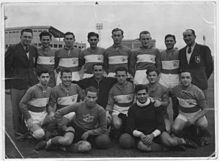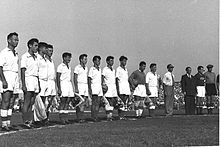Soccer in Israel
Soccer ( Hebrew כַּדוּרֶגֶל Kadu rule ) is the most popular sport in Israel . From 1956 to 1974 the Israel Football Association (IFA) was a member of the Asian Football Confederation (AFC). In the period that followed, the IFA was not affiliated with any confederation. In 1994 the association became a full member of UEFA . That is why the Israeli national teams compete in all international competitions as part of Europe .
history
Foundation of the association under British influence
Under a British mandate , British forces brought football to the region. The IFA was founded in 1928 as the Football Association of Palestine and incorporated into FIFA in 1929 . In 1956, the association, which was renamed the Israel Football Association due to the founding of Israel in 1948 , joined the Asian Football Association (AFC).
Due to the British influence, there were initially many British and Jewish associations. Arabs, on the other hand, were rare, but they also took part in IFA competitions. The oldest club in Israel is Maccabi Tel Aviv , which was founded in 1906 as HaRishon LeZiyyon . 1912 in Petach Tikva , the club Maccabi Petach Tikva founded. Further Maccabi associations followed, which joined the Maccabi World Union founded in 1921 .
In the 1920s, before the IFA was founded, two cup competitions were held, in which the British military teams dominated. The predecessor of today's Ligat ha'Al was founded in 1932 . The first Israeli champion was the British police football team .
Since many countries for political reasons (see: Israel-Palestine conflict ) refused to run against the national selection of Israel , u. a. during the World Cup qualifiers in 1958 that Turkey , Indonesia and the Sudan , the association was founded in 1974 excluded due to increasing pressure from the Arab-Muslim members. From then on, Israel only competed in FIFA competitions, or occasionally with special permission in OFC , UEFA or CONMEBOL qualification tournaments. Israel became an associate member of UEFA in 1992 and finally a full member in 1994.
Football and politics
Football in Israel is difficult to understand without its political background. Even the associations that were founded in what was then the British mandate were offshoots of political organizations that represented the various directions within the Zionist movement. The political contradictions intensified the competition between the clubs.
Maccabi movement

The Maccabi movement (including Maccabi Tel Aviv , Maccabi Petach Tikwa or Maccabi Netanja ) was founded in 1921 and was close to the commoners. Its aim is to promote the awareness of Jewish youth for religious, cultural and national values. The term Maccabi is derived from the name of the Maccabees family of priests . The members are seen as freedom fighters and fight for a free Israel and Judaism . The Star of David can be found in all Maccabi club logos. The movement soon had more than 100,000 members and met with strong resistance, especially from the communists from the Soviet Union , so all Maccabi clubs in the Soviet Union were gradually banned and dissolved by the end of the 1920s.
Beitar movement
The Beitar was founded in 1923 as a Zionist youth organization. In 1924 the sports association was established as a department of the Beitar. The most famous association of the Beitar movement is Beitar Jerusalem . It is primarily a revisionist organization and is known for its anti-Arab actions and is seen as particularly ethnocentric to racist . At Beitar no Arab or Israeli-Arab players should play. The Israeli national team should also not appoint players from Beitar. To clarify their point of view, Beitar supporters attacked Arab Israelis in a supermarket after a game in March 2012 and set fire to the Beitar clubhouse in February 2013 after the club announced it would sign two Muslim players. Hostile chants against Arabs can often be heard in the stadium at Beitar. Today the club's management tries to fight against racism within its own ranks and received the anti-racism prize from Israeli President Reuven Rivlin .
Hapoel movement
The Hapoel movement represents the workers ( Hapoel to dt. = Workers) and is also the largest movement in the country. Well-known clubs are Hapoel Be'er Scheva , Hapoel Ironi Kirjat Schmona or Hapoel Akko . The movement is considered particularly liberal and open. Sometimes it also contains left-wing extremist influences. For example, sentences like “Give Jerusalem to the Palestinians” or “Jerusalem belongs to Jordan” can be heard in the Ultras from Hapoel Tel Aviv . Above all, however, the Hapoel supporters are very committed to society. For example, fans of Hapoel Katamon Jerusalem organized Hebrew courses for immigrants from Ethiopia , or looked after children from the intercultural school Yad be Yad .
Soccer and Palestine
In addition to the Israeli clubs, there are also football clubs that emerged from Israeli settlements on the West Bank, such as Givat Zeev , Ma'ale Adumim or Ariel . Six of these clubs take part in the IFA's league operations. The Palestinians are protesting against this because, according to the FIFA statutes, a club is not allowed to play on the territory of another association if that association refuses to do so. Since the West Bank is not part of Israeli national territory, the clubs have no right to play in the Israeli league or to be members of the IFA at all.
The IFA argued against the fact that the territories in the West Bank, where playing the clubs, only controversial and not occupied are. The status of the areas can not be determined by FIFA, but must be clarified by Israelis and Palestinians at a political level. FIFA followed this line of argument.
The Israeli international Abbas Suan was booed by his own fans in the stands during every contact with the ball during the friendly against Croatia in 2005 and accompanied by monkey noises because his parents are Palestinians .
League system
| level | Division | ||||||||||||||||
|---|---|---|---|---|---|---|---|---|---|---|---|---|---|---|---|---|---|
| 1 |
Ligat ha'Al 14 clubs |
||||||||||||||||
| 2 |
Liga Leumit 16 clubs |
||||||||||||||||
| 3 |
Liga Alef Nord 16 clubs |
Liga Alef South 16 clubs |
|||||||||||||||
| 4th |
Liga Bet North A 16 clubs |
Liga Bet North B 16 clubs |
Liga Bet South A 16 clubs |
Liga Bet South B 16 clubs |
|||||||||||||
| 5 |
Liga Gimel Nord Upper Galilee 14 clubs |
Liga Gimel Nord Lower Galilee 14 clubs |
Liga Gimel Nord Jezreel 13 clubs |
Liga Gimel Nord Samaria 13 clubs |
Liga Gimel South Sharon 13 clubs |
Liga Gimel South Tel Aviv 14 clubs |
Liga Gimel Süd Zentral 12 clubs |
Liga Gimel Süd Süd 15 clubs |
|||||||||
The current league system has existed in its current form since 2009. The record champions of the Ha'Al league are Maccabi Tel Aviv with 21 championships.
Qualification for international competitions
- 1st place in the Ha'Al league
- 2nd and 3rd place in the Ha'Al league
- Gvia HaMedina: Winner
National cups
Gvia HaMedina
The Gvia HaMedina (Hebrew: גביע המדינה) is similar to the German DFB Cup . All Israeli teams have the opportunity to take part. The cup is played in the classic knockout mode, but the higher-class clubs only enter in later rounds. The final will be played in the Ramat Gan Stadium (National Stadium ) and the winner will qualify for the UEFA Europa League . Here, too, Maccabi Tel Aviv is the record winner with 23 trophies won.
Gvia HaToto
The Israeli Toto Cup (Hebrew: גביע הטוטו, Gvia HaToto) is similar to the English League Cup . Each league has its own trophy at each level. The cup will initially be played in a group stage, with the two best-placed teams qualifying for the knockout round. As with the HaMedina, the final will be held in the national stadium. However, the winner does not qualify for the UEFA Europa League.
Supercup
The Israeli Supercup has been held again since 2015 . Here the master plays against the cup winner. Should a team win the double , they will face the runner-up from the Ha'Al league.
National teams
Men's
The first international match of the Israeli national soccer team took place on September 26, 1948 in New York against the American selection . The game was lost with 1: 3.
Israel qualified for the Asian Championships four times between 1956 and 1974 . After losing two finals, the national team won a title at the AFC in 1964 for the first time in their own country. For the World Cup , Israel could only qualify for the 1970 in Mexico . You were eliminated with two points (one each against Sweden and Italy ) as the bottom of the group in the preliminary round.
An Israeli selection took part in the Olympic Games twice. Both in 1968 in Mexico City , and in Montreal in 1976 they reached the quarter-finals.
In November 2008, Israel was ranked 15th in the FIFA world rankings , which is still the highest ranking today.
The Austrian Andreas Herzog has been Israel's national coach since August 1, 2018 .
Ladies
The women's national team of Israel played their first international match on August 27, 1977 against the national team of women from the Netherlands , which was lost 0:12. Only after more than 20 years after their first international match did the team play their second game against Romania on November 2, 1997 .
The Israeli women's national soccer team has never qualified for a World or European Championship.
youth
Youth national teams also represent the IFA on an international level. The greatest success of an Israeli national junior soccer team was third place at the 1996 European Under-16 Championship .
Stages
Relevant stages in Israel are:
- The Ramat Gan Stadium (41,583 seats; 13,370 for UEFA games) is the national stadium of the Israeli national football team and is located in Ramat Gan , an eastern suburb of Tel Aviv .
- The Sammy Ofer Stadium (30,820 seats) is Israel's first UEFA Category 4 stadium and is located in Haifa in the north of the country.
- The Teddy Stadium (32,000 seats) is the most modern and largest stadium in Israel. It's in Jerusalem .
Web links
Individual evidence
- ↑ a b Football in Israel: A Question of Faith. In: Spiegel Online. Retrieved November 1, 2018 .
- ^ A b c Football in Israel: An SRF interview in a fact check. Retrieved November 20, 2018 .
- ↑ How German football is embracing Israel. Retrieved November 1, 2018 .
- ↑ FIFA asks Israel to assist Palestinian soccer. In: cbc.ca. Retrieved November 1, 2018 .
- ^ Counterrevolutionary Zionist Hydra. Retrieved November 2, 2018 .
- ↑ a b The anti-Muslim football fans from Jerusalem. In: Zeit Online . Retrieved November 2, 2018 .
- ↑ The only club in Israel without Arabs - Trouble at Beitar Jerusalem: How racist ultras split their club. In: Spiegel Online . Retrieved November 2, 2018 .
- ↑ Central Council of Jews in Germany Kdö.R .: Football: “No place for racism” | Jewish general. Retrieved November 2, 2018 .
- ^ Beitar Jerusalem wins anti-racism award for reducing anti-Arab chants. Retrieved November 2, 2018 .
- ↑ Duel against "FC St. Pauli vom Mediterranean". In: Abendblatt.de. Retrieved November 2, 2018 .
- ^ WBC Willy Brandt Center Jerusalem. webarchive.org, April 16, 2013, accessed November 2, 2018 .
- ↑ FIFA won't take up Palestinian complaint against Israeli clubs. Retrieved November 2, 2018 .



